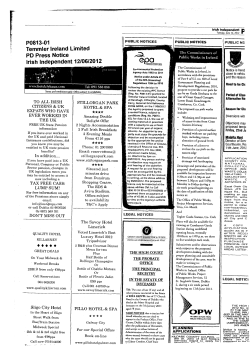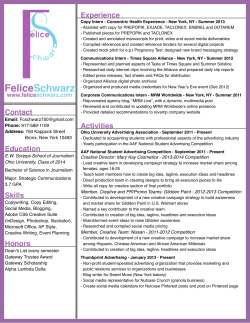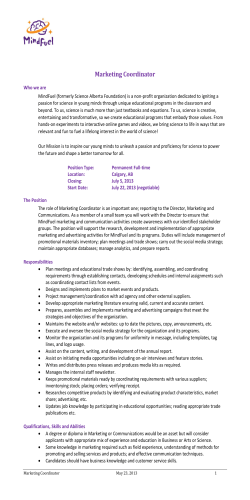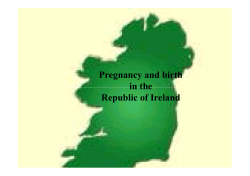
IBI Broadcasting Conference Conference Dinner
IBI Broadcasting Conference Conference Dinner Monday 2 April 2012 Pre-dinner Speech by RTÉ Director General, Noel Curran Good evening I am delighted to be addressing you here tonight and thank you for the invitation. Before I start, can I wish you all well at tomorrow’s conference. We all have busy lives and it is a good thing to sometimes step back and take a broader view of the challenges facing your businesses and the radio sector. Normally people might say that the independent radio sector might provide a hostile forum for the Director General of RTÉ, but in this, as in all matters, hostility is a relative term, and given what my everyday life is like at the moment, this feels like a haven of warmth and welcome. Seriously though, I am not in a position to comment this evening on ongoing processes relating to RTÉ’s Current Affairs output. I will be speaking at length about these issues shortly. However I am determined that RTÉ will show proper accountability for the mistakes we have made. We will learn from our mistakes, fix what needs fixing and ensure that we do not lose our nerve when it comes to challenging investigative programming. However tonight, I do think the context, particularly the economic context, in which we are speaking cannot be ignored. I will deal with the more particular issues of that 1 context later, but first lets have a cold look at the harsh reality for the radio sector out there. We may differ on a lot given the organizations that we serve, but in a very real way we share the same challenges. I hope to go through some of those challenges with you this evening and outline to you what RTÉ is hoping to do in the future to help meet them. I would first like to begin by saying that although my own background is in television, I have a great admiration and not a little envy for the people who work in radio. Perhaps, above all others, you are the purest of broadcasters. There is something refreshingly simple about a well written, well delivered radio piece, the clarity of one voice speaking, the joy of a well chosen song. Be it a well crafted documentary, a Sunday county final commentary, the somberness of the death notices or the indulgence of a good music show- radio has that unique ability to stop the world and allow us escape a while. It is the best of company, it shortens journeys, it demands reflection, and it connects without intrusion. I have always felt that people who work in radio, be it community, local, regional or national have a vocation. Something about the medium demands greater commitment, usually for less financial reward and often to smaller audiences. And this dedication and commitment from people all across the country results in one of the most varied, richest and most audience focused services in the country. What’s more, Irish people love radio: 85% of all adults each listen for more than three hours per day. This compares with, despite all the hype, just 5% of all adults who use twitter, and those that do, only use it for two minutes per day. Even young people, who are those that are most engaged with social media and digital sources of music and content - 80% of them continue to listen to radio every day. 2 In many ways, radio suits us. It suits us because we are an oral people who have an ear for the word, for dialect, for music, for the well chosen phrase, for the story at the heart of things. It suits us because we all want and need to connect and radio has proven to be the most social media of all. It suits us because it is easy to make and because its economic scale fits our nation, our regions and our localities. Any scan across the schedules will find all tastes of music catered for, all sports covered with passion and all issues from arts to politics to history to science discussed with intelligence, with depth and with a real understanding of the audience it caters to. In this intimate space of radio, the fabric of our society is woven. It’s an intimacy that comes to the fore in the local and community services in which we are so rich. I live in Carrickmacross, County Monaghan where both Northern Sound and LMFM have loyal followings. I know first-hand the kind of social and cultural dialogue which local radio facilitates. I know it enriches all aspects of our communities and strengthens our sense of identity, no matter where we live. Local radio services, although operating primarily for commercial purposes, in some cases provide a very real public service, one with a local perspective that helps bind communities together. Although RTÉ competes with independent radio, there is no doubt that we all benefit from the variety and range of comment available to our listeners. Be it in morning, evening or afternoon, we are only a button away from a different point of view. Ray Ryan or Tom, Matt, Mary, George, or Joe Finnegan on Northern Sound – each provides a rich thread in the tapestry that makes up Irish life. 3 And to do this 24 hours a day, 7 days a week, 52 weeks of the year is a huge commitment by us all. One that is getting tested as this recession continues to bite into the advertising revenue that feeds us. And it is biting. I know you have all felt first-hand the downturn of these past few years. Let me for a few moments tell you how it affected RTÉ. When recession bit, the fall-off in broadcast advertising in Ireland was the most extreme in Europe. RTÉ experienced a sudden loss of €70 million in annual commercial revenues from mid-2008. We responded by rapidly cutting costs. Our staff was the first among the public sector to agree pay cuts. We cut €82 million or 18% off our cost base. The rest of the semi-state sector reduced their costs by an average of 6%. Staff numbers reduced by 200, over two years. We suffered a substantial reduction in public funding in the Budget of December 2010. Commercial revenue also fell and unplanned external factors, including the two State visits, subsequently pushed our potential deficit to 34 million euro. We cut again, and RTÉ reduced that by half last year. With further restructuring and cost reduction of the order of 25 million euro as announced last week, we aim to break-even in 2013. So I understand the pressure that many of you and your organizations face tonight. I understand it because I am dealing with the same issues every day. Like you, we are having to prioritise. We are having to make harsh choices. However, I understand that although we all face similar challenges, I am not under any illusion about the privilege that the licence fee grants RTÉ. At a time when 4 commercial income is reducing, the licence fee grants us a cushion that no privately funded station has. A cushion that rightly comes with considerably more obligations and more regulatory oversight than the commercial sector, but nonetheless, one that ensures that we can continue to fulfill our mandate to broadcast. The licence fee exists to create national services that serve all of the community and across all platforms. RTÉ is a media hub that can and should benefit all Irish media organisations, be they private or public. We recognise that our role now is broader than servicing the audiences that depend on our services. Our role is also to help the industry of which we are a part, in any way that we reasonable can. What does this mean for you here tonight? I very much want RTÉ’s to seek mutually beneficial partnerships with companies and organisations that have an interest, like us, in the provision of quality Irish content. Media relationships in this market are changing, competitors of course continue to protect their own interests but we also realize that there are also shared interests that can drive real change. For example, RTÉ has been in discussions with individual newspaper groups for a number of months now about content-sharing possibilities and hopefully audiences will soon see the results of these discussions online. Opportunities also exist for the radio sector. I strongly believe that RTÉ can complement the independent radio sector in Ireland, not merely compete with it. I believe that RTÉ has a responsibility to explore ways in which it can enrich and strengthen the radio sector, not weaken it. 5 I believe that RTÉ has a vital role to play in the infrastructure, development, training, distribution and content creation of Irish radio and I am committed to fulfilling that role. RTÉ and the independent radio sector have show in past year that they can work together to enhance the listening experience of our audiences. RadioGAUGE is an award-winning initiative that allows radio owners to provide their customers with evidence of the effects of their radio advertising campaigns. RadioGAUGE was piloted by the IBI and RTÉ Radio with a number of advertising agencies during 2011 and the success of this pilot sees RTÉ Radio and also the IBI invest over €100,000 in launching RadioGAUGE in Ireland. RadioGAUGE is a significant investment by the entire radio industry to work with advertisers to help them improve the creativity and effectiveness of their advertising. CHOOSE RADIO- a joint advertising campaign by IBI and RTÉ aimed at increasing number of radio listeners- which began with the fat Samoan campaign is now in its 4th year. – is another example of what can be achieved when we work together. So tonight, before I finish, may I suggest other areas where we can help each other overcome the challenges we all face. Can we work together to develop our people? How can those people who chose to work in radio have more fulfilling careers, how can they receive more training to improve their skills, how can they work across a variety of programming to increase their range and breadth as content creators? Is there an opportunity here? RTÉ now spends approximately €1 million per year commissioning radio programming from independent radio producers – programmes such as Green Tea, The Business and others. Should this be part of broader relationship to develop and improve production and editorial skills in the independent sector which would benefit all of us? 6 How can we provide platforms for debate, discussion and collaboration on our industry- be it seminars, conferences, thought leadership events and more? Are there ways in which we can share content relevant to our respective audiences? RTÉ already shares its radio documentaries with Community Radio stations across the country, could or should we do the same with the local commercial sector? Would you be interested? Could we work together more closely on sharing content and resources in the coverage of local and national elections? Are there ways in which RTÉ can share its publicly owned facilities and studios around the country in a way that benefits the wider radio production fraternity? Can RTÉ and the independent sector work together in the areas of 3rd level education, in policy formation and in infrastructure streamlining? These are just some of the areas in which I find we have common ground. But perhaps there are more. If there are, RTÉ wants to hear about it. Can we identify areas where we can produce unique content together? Areas of true innovation across schedules? What is the sum of our skills and how would that be expressed for the benefit of our listeners? And then are there ways in which we can reduce the challenges ahead by facing them togetherWe must chart a future for digital radio in Ireland, together. RTÉ’s experience and research tells us that people like digital radio when they experience it: they like the clear sound, the ease of use, and the new services. However, where we are all struggling is in delivering an easily communicated definition as to what digital radio is. 7 A definition of digital radio that includes every form of digital carriage including cable, satellite, internet, mobile/smart phone and terrestrial is not informative – it tells the consumer nothing by telling them too much - the end result is just confusing. I believe the public can make a clear distinction between online radio and radio over the air and this distinction makes it easier for us to arrive at a public message where the points of difference and improvement between digital radio and FM are clear. In other words, we can more easily explain digital radio if we show it in relation to the consumer’s present understanding of FM radio. To the public, FM Radio is mobile, free, everywhere and non-visual. Digital radio has all of these characteristics, with the added benefit of greater ease of use and more stations. Is it not more sensible to build on this shared understanding of radio as a platform rather than seek to redefine it? Perhaps this is where we must start. Simply doing nothing is not an option. We all need to work together, with the BAI and the Department, to develop a coherent medium and long term plan for our industry beyond FM – whatever that is. That does not mean we can’t do simple practical things right now to help the radio sector embrace the digital age. Of course we will always compete on content, but can we not share technology? In the UK for example, Radioplayer, is a common internet player developed by the BBC and independent commercial radio stations to reduce and share technology costs and provide a consistent quality of service for online radio listening. Just a couple of weeks ago it was announced that Radioplayer will launch a mobile application for Apple and Android devices – offering audiences the same unified radio experience on the go. Could or should we consider something similar for 8 Ireland? – a global gateway to all Irish Radio? RTÉ would welcome a move in this direction. These are just some areas where I think we can and must work together. I totally believe that in a country of 4.5m people, we need to use all our combined creativity to confront our future, and what is more, I believe that based on our track record, Ireland has so much potential in this area that it would be remiss of us not to explore it to its very edge. In 1988 when the first commercial licences were being granted, RTÉ believed it faced the biggest threat since its foundation. We believed we would hemorrhage audiences and the game was up as far as radio was concerned. As experienced broadcasters we knew the power of the local story and we struggled to find ways in which to compete. Gay Byrne often talks about his own worries at the time and credits this as the main reason for the development of Joe Duffy. Gay was sending him out to cover regional stories to remind people outside Dublin we hadn’t forgotten them… A bit Don Quixote and Pancho Sanchez perhaps, but it shows how real the threat was to those in RTÉ. Yet, despite those fears and concerns, a radio sector has developed in this country that is comparable in range and quality to any other I know of. We must all work together to ensure this continues. 9
© Copyright 2026










